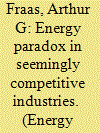| Srl | Item |
| 1 |
ID:
186427


|
|
|
|
|
| Summary/Abstract |
This paper uses household survey data from Australia to investigate whether renters face larger energy bills than otherwise similar households. We find that a negative unconditional effect of renting on residential electricity expenditure becomes positive when controlling for log net wealth, with renters on average spending about 8% more than otherwise similar households. This is a larger effect than in most prior studies. The effect operates via higher usage quantities rather than higher average prices, and a similar effect is found for overall residential energy expenditure including natural gas. Central to the story is that renters tend to have lower net wealth, and net wealth is associated with higher energy use due to reasons including additional appliance ownership. This makes net wealth an important control. The findings cast light on the potential for more ambitious policy responses to reduce energy-related disadvantages faced by renters in Australia. There is also scope for further research into whether similarly large effects are evident in other countries.
|
|
|
|
|
|
|
|
|
|
|
|
|
|
|
|
| 2 |
ID:
166469


|
|
|
|
|
| Summary/Abstract |
Several federal agencies claim the existence of an energy paradox in competitive markets in their benefit-cost analyses: firms fail to use energy-saving equipment that on net would reduce their costs. Such findings appear incompatible with neoclassical views that private firms in competitive markets will seek to minimize costs. EPA and NHTSA (2016) justify their findings in part by claiming that owners of trailers pulled by others underinvest in energy-saving equipment because the trailer owners incur the costs of such investments while tractor owners get the benefits. We collected roadside data over three summers and model use of energy-saving equipment on trailers. We find associations consistent with cost-reducing behavior in the use of energy efficiency devices, such as skirts and automatic tire inflation devices, but no evidence that different ownership of tractors and trailers is associated with reduced use of energy-saving equipment on trailers. We recommend that EPA and NHTSA assess the in-use cost-effectiveness of such equipment and rigorously review the empirical basis for claims of market failures in competitive markets before claiming significant private economic gains in rulemakings.
|
|
|
|
|
|
|
|
|
|
|
|
|
|
|
|
| 3 |
ID:
115149


|
|
|
|
|
| Publication |
2012.
|
| Summary/Abstract |
The split incentive problem concerns the lack of appropriate incentives to implement energy efficiency measures. In particular, low income tenants face a phenomenon of energy poverty in which they allocate significantly more of their household income to energy expenditures than other renters. This problem is substantial, affecting 1.89% of all United States' energy use. If effectively addressed, it would create a range of savings between 4 and 11 billion dollars per year for many of the nation's poorest residents. We argue that a carefully designed program of incentives for participants (including landlords) in conjunction with a unique type of utility-managed on-bill financing mechanism has significant potential to solve many of the complications. We focus on three kinds of split incentives, five concerns inherent to addressing split incentive problems (scale, endurance, incentives, savings, political disfavor), and provide a detailed policy proposal designed to surpass those problems, with a particular focus on low-income tenants in a U.S. context.
|
|
|
|
|
|
|
|
|
|
|
|
|
|
|
|